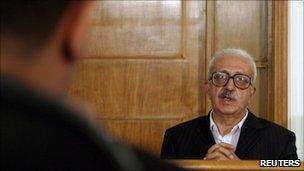Tariq Aziz: Saddam's dangerously loyal courtier
- Published

Tariq Aziz was Saddam Hussein's loyal courtier
It is not hard to detect a whiff of revenge in the Iraqi Supreme Court's decision to sentence Tariq Aziz, one of President Saddam Hussein's most loyal supporters, to death.
The accusation by his lawyer, Badee Izzat Aref, that the verdict is politically motivated, will no doubt be angrily dismissed by most Shia politicians in Iraq. But many Sunni politicians will agree, at least quietly.
Tariq Aziz's sharp brain and even sharper tongue made him a great many enemies.
When Saddam Hussein was overthrown by the US-led invasion of 2003, Aziz was one of the most hated of his officials.
There was a clear determination in parts of the dysfunctional administration headed by Paul Bremer to see that Tariq Aziz was charged with serious crimes, with the intention of hanging him.
There is little doubt that Aziz's success in winning support in the Arab world, in Russia, and other areas where hostility to the US-led invasion was strongest had made him a marked man.
Slowly, though, the US lawyers in Baghdad ceased to insist on his trial for the more serious crimes. But Iraqi lawyers still wanted him put on trial.
He was eventually charged over his supposed part in the execution of several dozen merchants in Baghdad and elsewhere for 'profiteering' - in other words, overcharging their customers.
'Saddam's front-man'
The court which tried him heard plenty of accusations that Aziz had argued for the execution of the merchants.
Tariq Aziz claimed he tried to dissuade Saddam Hussein from invading Kuwait
But there was no evidence that a Western court would regard as compelling that he had anything like final responsibility for the carrying out of the executions.
Five months afterwards he received a further seven-year sentence for what amounted to the ethnic cleansing of Kurds.
Again, it was clear that Tariq Aziz had strongly supported the policy. But there was no real evidence of his personal involvement and guilt.
His crime, essentially, was that he was Saddam's front-man, arguing publicly and cleverly for some of his worst policies.
The Iraqi opposition, like the Americans and their supporters, felt a particular hatred for him.
He was a strong supporter of violent action against Shia and other resistance groups - the crime for which he has been sentenced to death.
But again, it is hard to feel that final proof of his involvement in this kind of action was demonstrated.
Tariq Aziz was Saddam Hussein's loyal courtier. If he had questioned his judgements, he would have died. This is not an argument for his innocence, but it does temper his direct responsibility for the policies he backed.
'Close to the edge'
Various former figures in Saddam's administration over the years have confirmed that in private, where he dared, Tariq Aziz tried to modify some of his master's views and decisions.
He himself has claimed that he tried to dissuade Saddam from invading Kuwait in 1990, and this seems to be true.
But he was always a dangerous figure, often close to the edge of savage violence.
In January 1991, in the early days of the first Gulf War, I met him in a hotel and started asking him questions he did not like. "If you ask me anything else," he screamed, "I shall have you liquidated". He was clearly capable of carrying out the threat.
Now, though, Tariq Aziz is an old man, broken in health. His execution would reflect badly on Iraq's system of justice, and on the growing influence of extremist Shia on the government.
The carrying out of the death sentence in Iraq in the last five years has not strengthened the country's reputation.
Many Iraqis will also believe that hanging a sick man of 74 will create sympathy for someone who scarcely deserves it.
- Published5 August 2010
- Published26 October 2010